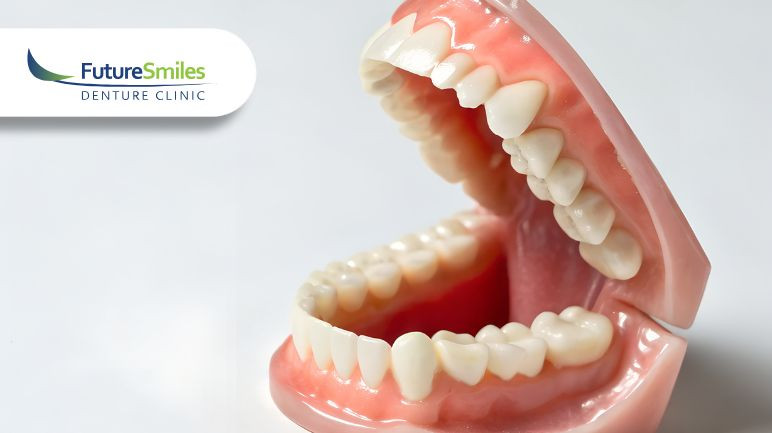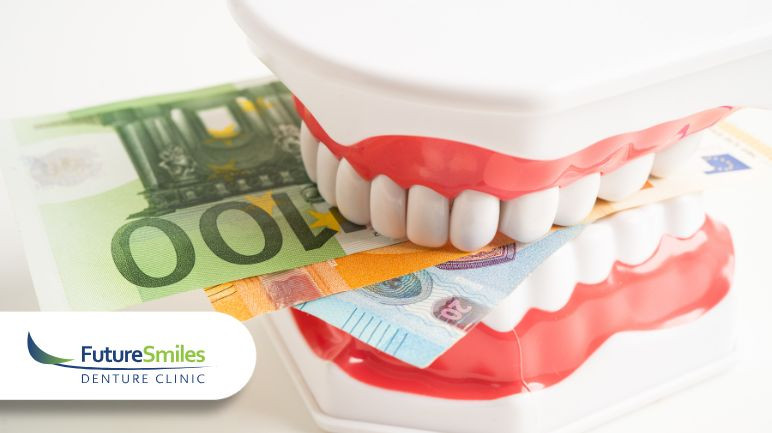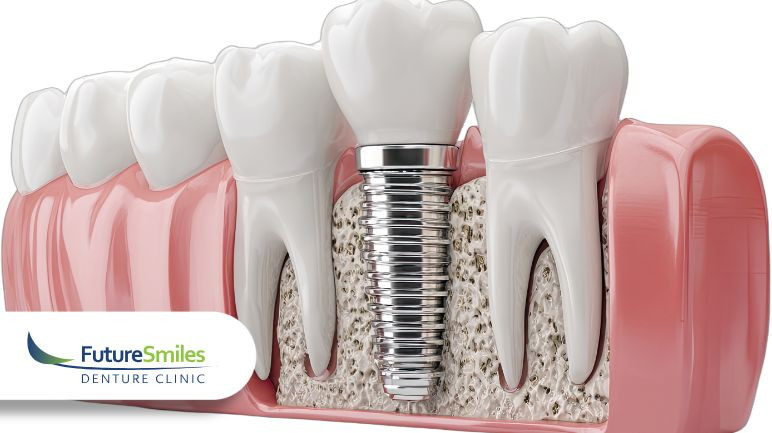Are you undergoing dental implant surgery? Here’s what the recovery process looks like and some tips on caring for your new teeth.
Whether you opt for dental implants or more traditional complete/partial dentures to replace your missing tooth (teeth), it’s important to remember that you should NEVER ignore tooth loss.
Doing so can lead to many more serious issues in the future, including:
- Further tooth loss
- Difficulty eating and speaking
- Gum infections
- Changes in facial structure
- Lower quality of life
- Unwanted shifting of your remaining natural teeth
Restore Your Beautiful Smile With Our Calgary Dental Implants
At Future Smiles, our team has the expertise, tools, and experience to help restore your smile and meet all your oral healthcare needs. Whether you’re considering traditional complete dentures or implant-supported dentures, we offer house calls and flexible payment plans to make your denture experience as smooth and easy as possible.
Want to know more?
Calgary Implant Support Dentures
Dental Implant Surgery Recovery Period: What to Expect
Dental implants are an innovative tooth replacement method that is more natural-looking, durable, and comfortable than traditional dentures. However, it does require surgery, and just like any other type of surgery, a recovery period as well.
While in most cases, having dental implants inserted results in a conveniently short recovery period, this time will vary highly, depending on how:
- Your procedure went
- Well you take care of yourself afterward
- Your body reacts to the implant
Below is a guideline on what to expect from a dental implant surgery and the steps you can take to ensure you heal quickly and safely for the best results.
How long will healing take?
Typically, you can expect that it will take 5-7 days for all of your symptoms to subside, however, some patients may experience a longer recovery period due to factors such as:
-
How many dental implants they received: Depending on whether you get a single or multiple implants, your recovery time can vary. More implants mean that the surgery is longer and more complex, leading to a lengthier recovery period.
-
If bone grafting was done beforehand: Bone grafting is required when your jawbone isn’t thick enough to support an implant. If your denturist suggests a graft, then it can take several months for the healing process to take place.
-
How long osseointegration takes: This is the process of the dental implant integrating with your jawbone. This takes time to happen successfully and it will vary from patient to patient.
Bottom Line: Assuming the procedure goes well and there are no complications, you can expect your recovery to be approximately a week long.
Dental Implant Recovery: Day by Day Guide
This guide is to help you gain a better understanding of what your dental implant recovery process will look like and what you can do to make it more successful, and even perhaps speed it up.
Day One
After your surgery, you will be given a gauze pack to place on the treatment area. Make sure to keep firm, yet gentle, pressure on the pack with your bite as this will keep them in place.
Some of the symptoms you may experience include:
- Persistent bleeding
- Swelling in the treatment area
- Discomfort or pain
During the first 24 hours after your surgery, it’s important that you:
- Refrain from disturbing the surgical area
- Use a gentle toothbrush to brush your teeth the night after your surgery
- Apply ice to reduce any pain or swelling
- Take any pain medication prescribed by your doctor
Remember, these are all very normal effects of the surgery and are simply signs that your body is beginning to heal.
Day 2-3
During days 2-3, your body is continuing to recover, but it’s important to take good care of your mouth to help the process along.
During these days, you may experience:
- Some greenish-yellow discoloration around the treatment area (this is temporary)
- Stiff jaw muscles
- A sore throat
- Dry lips
These are all temporary side effects from your dental implant procedure and will disappear within a few days.
To speed up your recovery time, here are some things you may want to do:
- Rinse your mouth with warm salt water (at least 2-3 times a day)
- Keep up with your dental hygiene routine but avoid brushing with real vigor. Use a soft bristle toothbrush and gentle motions.
- Eat soft foods
- Drink lots of water to keep hydrated
Remember: Throughout your recovery period, you may experience pain, swelling, and some oozing, but it’s important to maintain good oral hygiene to ensure the best outcome.
Dental Implant Recovery: What Should Your Diet Look Like?
One of the simplest ways to ensure your mouth heals quickly and properly after your dental implant procedure is to temporarily change your diet, especially avoiding hard foods until the area has completely healed.
Foods You Should Eat After Dental Implant Surgery
During your recovery, you should eat mostly soft foods, alternating which side of the mouth you chew on.
Here are some things you can eat:
- Avocado
- Baked beans
- Eggs
- Smoothies or healthy juices
- Fish
- Noodles/Rice
- Oatmeal
Foods You Should Avoid After Dental Implant Surgery
Here are some of the foods you should avoid temporarily while you are recovering from surgery:
- Hard foods (chips, nuts, apples)
- Tough food (meats)
- Acidic foods (lemons, limes, oranges)
- Popcorn
- Spicy food
A general rule of thumb: During your recovery, stick to soft and liquid-like food and avoid anything that is hard, sticky, or spicy.
Call Today
To find out more about the costs and benefits of dental implant surgery, and how our Calgary denturist can help restore your smile to its healthy and beautiful state, contact our denture clinic today at (403) 475-0016 or book a FREE consultation.






